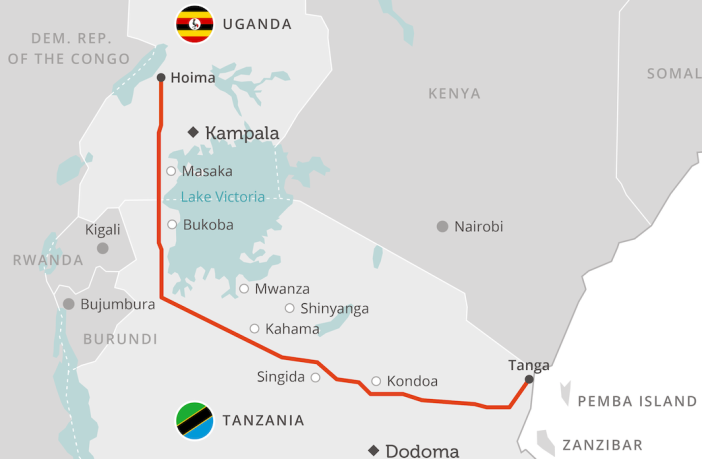- The European Parliament has adopted a groundbreaking resolution that officially recognises the disastrous consequences for both human rights and the climate due to the construction of TotalEnergies East African Crude Oil Pipeline (EACOP).
- This pipeline, under construction in Uganda and Tanzania, would be the largest heated oil pipeline in the world.
- More than one hundred thousand families and farmers are already being displaced from their lands, if completed the pipeline would generate over 34 million tons of CO2 emissions every year, and threaten protected wildlife.
This EU resolution puts further pressure on the financiers and corporations behind EACOP that are already facing sustained resistance from local communities – and millions of people around the world. It comes against the background of recent protests by communities in parts of Uganda, citing failure by Total to mitigate against the impacts of the Tilenga oil projects on them.
Omar Elmawi, Coordinator at Stop EACOP campaign says:
“By denouncing the persecution and intimidation of human rights defenders who dare to criticize the project – several of whom have been arbitrarily arrested in the past – the resolution by the European parliament is sending a clear message that the rights of the people in Uganda and Tanzania should come before the interests of corporations and governments out to enrich themselves. The resolution however urges Total to study the feasibility of an alternative road but if we want to safeguard the environment and water resources, there’s only one road – ending this project that violates human rights and our environment. Communities and climate activists have already expressed their concerns and continued resistance to EACOP. The responsibility lies with the financiers to take a stand against this project.”
East Africa Crude Oil Pipeline facts:
- The East African Crude Oil Pipeline (EACOP) will be more than 1,400 km long – the distance between Paris and Rome – and would run alongside Lake Victoria basin, which is the continent’s largest freshwater reserve and the source of the Nile, between Uganda and Tanzania.
- The oil would be heated permanently to 50°C to keep it fluid and transport it to the port of Tanga, in Tanzania, and into international shipping tankers.
- This pipeline would transport 200,000 barrels of oil per day and generate up to 34 million tons of carbon emissions each year – seven times what Uganda emits each year and about 1/16th of France’s emissions.
- More than 100,000 people are being forced off their land and expropriated.The project risks poisoning the water resources and wetlands of Uganda and Tanzania, including the Lake Victoria Basin, on which more than 40 million people depend for drinking water, food production and their livelihoods.
- This will violate a multitude of human rights: the right to property, the right to an adequate standard of living, the right to food, the right to education, the right to health, the right to adequate housing, the right to life and safety, the right to freedom of expression, assembly and association, and the right to free, prior and informed consent.
- There are threats, harassment, intimidation, attacks, arrests and imprisonment of environmental, human rights and journalistic defenders.
Author: Bryan Groenendaal















